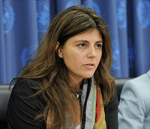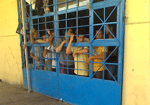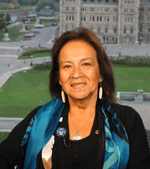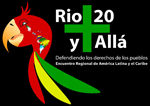News
Published on Thu, 2012-05-24 09:14

Demonstration after the elections
in Greece.
(Photo: Popicinio_01/Flickr/CC)
|
The economic crisis in Europe is deepening and may get worse, with worrisome effects on the rest of the world, warned Martin Khor, executive director of South Centre, in his most recent column for The Star, one of the leading Malaysian newspapers.
|
Published on Thu, 2012-05-24 09:10
More than 20 international and regional civil society organizations and networks and some 130 from countries all over the world launched the “Global Campaign to Demand Climate Justice”, with the aims of countering “moves by powerful governments, international institutions and global corporations that will bring more harm to people and planet”, and “to fight for global measures that will stave off catastrophic climate change and enable people to deal with present and future impacts”.
|
Published on Thu, 2012-05-24 09:06

Buildings of the Federal
Government in Ottawa.
(Photo: Radio Canada)
|
The total number of federal core public service job losses over the next three years will be 29,600 —far more than the 19,200 estimate that is now commonly cited, says a new analysis by the Canadian Centre for Policy Alternatives (CCPA).
|
Published on Wed, 2012-05-23 08:41
After the informal negotiations earlier this month at the UN Headquarters in New York on the way to the United Nations Conference on Sustainable Development (Rio2012), several civil society organizations decided to hold next week a consultation in La Paz, Bolivia, to discuss the Latin American and Caribbean agenda at the meeting and to prepare the simultaneous People’s Summit.
|
Published on Wed, 2012-05-23 08:34

Gyekye Tanoh. (Photo: Gulf Times)
|
The Economic Justice Network (EJN), a coalition of Ghanaian civil society organizations, has cautioned African countries involved in the negotiation of the Economic Partnership Agreements not to succumb to the pressure from European Union to sign the agreement as it has the potential of disintegrating the regional economies, reported several communications media.
|
Published on Tue, 2012-05-22 18:39

Egypt presidential elections posters
and billboards.
(Photo: gr33ndata/Tarek/Flickr/CC)
|
The Egyptian Association for Community Participation Enhancement (EACPE, focal point of Social Watch in the Arab country) said it would not monitor the presidential elections this week because of the restrictions placed on non governmental organizations by the government.
|
Published on Thu, 2012-05-17 08:57

Palestinian people also take the
streets. (Photo:
Issam Rimawi/APA)
|
A large group of Arab NGO Network for Development (ANND) members and partners is visiting Washington this week to express the positions and perspectives of civil society organizations from Middle East and North Africa on the United States foreign policy towards the region. Twelve activists and experts representing ten countries (Egypt, Tunisia, Palestine, Lebanon, Jordan, Morocco, Bahrain, Yemen, Sudan, and Iraq) are also seizing the opportunity to enhance spaces for the dialogue between Arab groups and US civic stakeholders and policy makers.
|
Published on Thu, 2012-05-17 08:55

Special Rapporteur Magdalena
Sepúlveda. (Photo: UN)
|
A group of United Nations independent experts urged the European Union (EU) to take the lead in promoting the adoption of a global financial transaction tax (FTT) to offset the costs of the enduring economic, financial, fuel, climate and food crises, and to protect basic human rights.
|
Published on Thu, 2012-05-17 08:52

Photo : Caritas Europa
|
More than 160 human rights organizations, among them Terre des Hommes, Caritas Europa, Amnesty International and Human Rights Watch, has signed the appeal “Not crossing red lines-A negotiators’ checklist on minimum detention safeguards”, insisting that EU institutions ensure respect for asylum seekers’ right to liberty in recast Reception Conditions Directive and Dublin Regulation.
|
Published on Wed, 2012-05-16 09:30

Jeannette Corbiere Lavell.
(Photo: NWAC)
|
Based on the Canadian experience, the Native Women's Association (NWAC), the Feminist Alliance for International Action (FAFIA, member of the Social Watch national coalition) and other organizations stated this month at the UN Permanent Forum on Indigenous Issues that all governments should “immediately develop and implement a national strategy to address the disadvantaged social and economic conditions of Aboriginal women and girls, including poverty, inadequate housing, low educational attainment, inadequate child welfare policies, and over-criminalization”.
|
SUSCRIBE TO OUR NEWSLETTER
Submit

|












